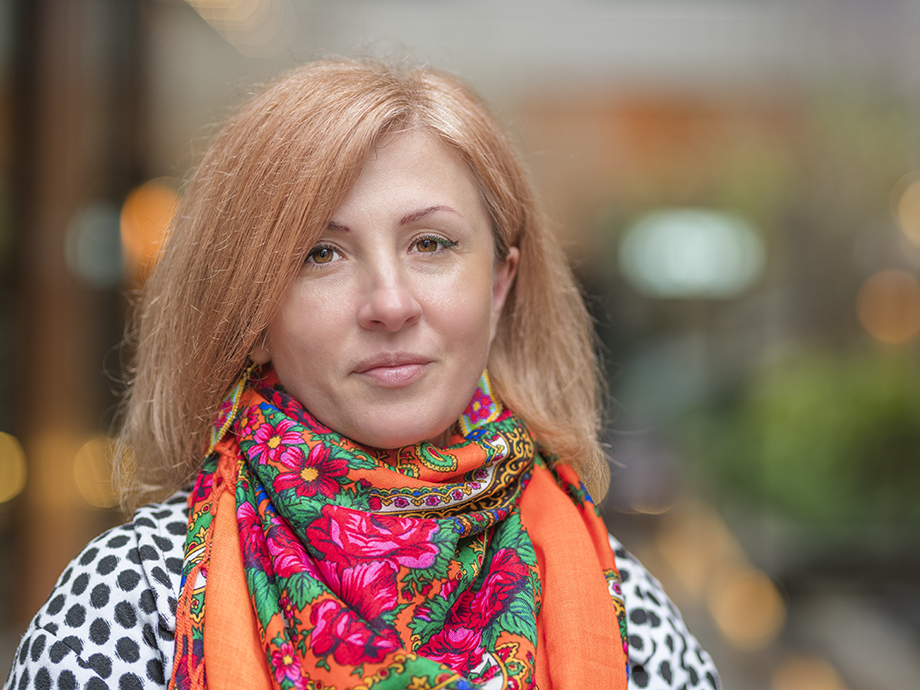Inna Kovtun was lying in her bed in Kyiv at 11 p.m. on Feb. 23, 2022, talking on the phone with the general director of her orchestra. She told him she was scared their orchestra would be unable to perform the next day. He reassured her that everything would be all right. The next day, Russia invaded Ukraine, and the war began.
Born in 1984, Kovtun grew up in Krasnopillia, a small Ukrainian town near the Russian border. Although she performed well in all of her classes, singing was where Kovton truly shone. She remembers her first-grade teacher recognizing her talent and inviting her uncle, the artistic director for a local folklore ensemble, to hear her perform. He initially believed that the song she was to perform would be too difficult for such a young child, but she stunned him when she began to sing.
After finishing the ninth grade, Kovtun had to decide what to study in college the following year as is typical in Ukraine. Although she wanted to help people by becoming a doctor, her music teacher encouraged her to become a professional singer.
“You have a beautiful voice and are a superstar,” Kovtun’s teacher said, teasing her by saying, “if you don’t go to a music college, I will have a heart attack and die.”
Kovtun traveled throughout Ukraine with her parents, participating in many singing competitions. She remembers other kids always being disappointed when she would arrive at the competitions because they knew she would win.
As a child, she was self-motivated to succeed so that she could move to a big city. She felt that her talent was gifted to her by God and she had to use this talent. She wanted to sing Ukrainian folk music and represent her culture with pride. And she did.
Kovtun earned a master’s degree in music from Kyiv National University of Culture and Arts. Although she studied various genres of music, her studies emphasized Ukrainian folklore. She collected folklore from all of Ukraine and learned about the unique songs, dances, rituals, and traditions of each region. She participated in her university’s folk band, singing music from Estonia, Latvia, Poland, Germany, and Ukraine.
One day, Kovtun helped a friend sell coffee as part of a promotion at the coffee shop where her friend worked. While there, Kovtun met her friend’s boss, and they fell in love. After being together for seven years, Kovtun married him in 2013. A year later, they had a daughter.
Kovtun has worked as the artistic director for many artists, including her folk group Rozhanytsia She has recorded 10 albums and performed in many places, including Hong Kong, Poland, and Canada.
On Feb. 24, 2022, at 4:30 in the morning, just hours after the conversation with her orchestral director, Kovtun and her husband woke to the booming sounds of war and saw planes flying by their window. The airport, about 20 kilometers (12.5 miles) away, was on fire. She remembers feeling afraid and confused as to how this new reality was possible. With her husband and their daughter Paulina, the family evacuated their home.
It was impossible to leave Kyiv since so many people were trying to escape. The family slept for several nights in a subway station, but Paulina began to get sick. She became more and more ill and they knew that they had to go somewhere safe so that Paulina could rest. Eventually, they arrived in Lviv, a city in Western Ukraine, where they thought they were safe. But as the air-raid alarms started again, Paulina got worse.
Kovtun’s husband told her that she had to leave the country to save Paulina. One week after the war started, Kovtun and Paulina went to Poland.
“There was a big line at the border,” Kovtun says. “We stayed there for maybe 10 hours — not in a car but on foot. My husband couldn’t leave the country as most men who are eligible for military service in Ukraine are prohibited from leaving, but he waited in line with us. After 10 hours, we said goodbye to him and, in Poland, we got a taxi and went to my friend’s place.”
Kovtun and Paulina remained in Poland for three weeks before moving to Portland, Oregon, in 2022 to live with a friend. She continues to host concerts to fundraise for Ukraine. Kovtun also works at a camp for Ukrainian children in Portland, using her music to help them adjust to their new lives. Paulina, now 9 years old, has struggled to adjust to her new life in the United States, but she feels safe here and is beginning to make friends.
Despite it all, Kovtun remains optimistic and shares the advice that keeps her going.
“People don’t stop,” she says. “Try to live. Try to find something to help Ukraine, to help yourself, to find things to lift up your mood. Don’t stop, don’t give up, and continue to do what you love to do.”

